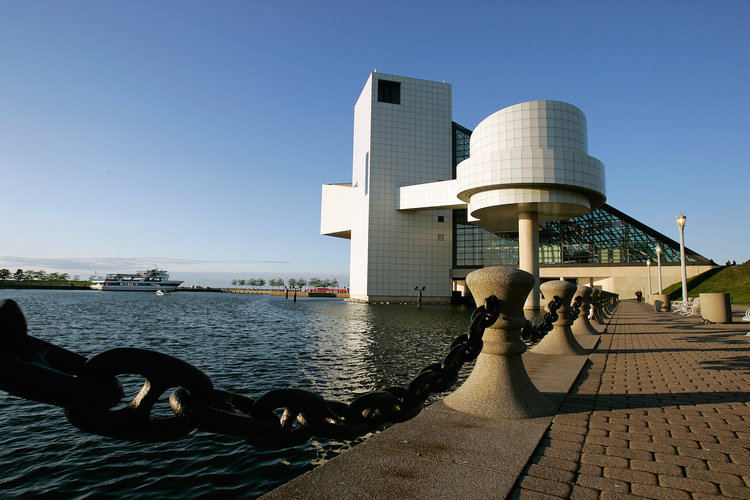
- After an extended period of stagnation, the Rock & Roll Hall of Fame museum in Cleveland, Ohio, has seen significant growth in recent years under the Hall’s CEO and president Greg Harris.
- Harris spoke to Business Insider about how the Hall has bloomed to become a “major international attraction,” while generating an annual record of $199 million in economic impact to the region last year.
When Rock & Roll Hall of Fame CEO and president Greg Harris took on his job as the head of the renowned music foundation and museum in 2012, he saw significant room for improvement.
For about the previous dozen years, attendance at the Hall’s museum in Cleveland, Ohio, had been flat. Harris’ predecessors, he said, were getting by managing expenses, but there was more that the museum could do to reach an international audience of music fans.
“We dug in deep to better understand our customers, understand our different audience segments,” Harris told Business Insider. “And then we started running after our targeted segments hard.”
The Hall identified that prospective visitors wanted more immersive activities and more modern forms of storytelling, along with more of the museum’s longtime staple of music artifacts.
Among its recent renovations addressing these goals, the museum opened a new exhibit last summer that included a state-of-the-art, three-screen theater, which premiered with the release of the final film from the late, Oscar-winning director Jonathan Demme, a documentary about the Hall’s induction ceremonies.
This week, tied to its latest induction ceremony on Saturday, the museum unveiled a renovated “Hall of Fame” floor and interactive voting stations for visitors to weigh in on the Hall’s next class of inductees.
Overall, the Hall’s series of changes have proven to be a considerable success, as the museum’s attendance has increased 64% over the four years since Harris implemented his plan in 2014. The Hall has also grown to be a greater boon to the Cleveland economy over the same period, with an estimated annual record of $199 million in economic impact generated for the region in 2017.
While the Hall was gearing up to induct its 33rd set of artists on Saturday — a class of inductees that includes acts like Nina Simone, Bon Jovi, and The Cars — Harris spoke to Business Insider earlier this week about how the museum has grown to become a “major international attraction.”
“In Cleveland, it’s a jewel”
The Rock & Roll Hall of Fame opened in Cleveland in 1995, after the city beat out several larger locations for the museum, including New York, San Francisco, Memphis, and Chicago, through a groundswell of local support and a multi-million-dollar investment from city officials.
In Cleveland, just the 51st most-populated city in the US, the museum stands out in a number of ways.
While the Hall’s distinct, modern architecture makes it a conspicuous sight in the city’s skyline on the shore of Lake Erie, the museum’s business has made a significant mark on Cleveland’s economy for more than two decades — and particularly in recent years.
“We opened 22 years ago, and the initial investment to build the place was $92 million,” Harris said. “We’ve returned that amount to the regional economy every year since opening. It’s been a great investment for northeast Ohio, and a great draw for the region.”
But since 2014, when Harris instituted his targeted four-year plan to “spur growth and engagement” for the museum, he said the Hall has seen significant growth in attendance and a furthered economic impact.
The museum’s website touts an infographic on the Hall’s estimated total economic impact of $199 million in 2017, a figure which includes nearly $60 million in wages generated to 1,872 jobs, and $127.4 million in visitor spending from an annual record of 568,000 visitors.
Harris said that between 80 to 90 percent of the museum’s visitors come from out of town, and he called the museum Cleveland’s “major international attraction.”
“In Cleveland, it’s a jewel,” he said of the museum. “In a bigger market, we would be one of numerous attractions. But here, we’ve become symbolic as the signature piece for this city. When you walk through the airport in Cleveland, you know you’re in the home of the Rock and Roll Hall of Fame.”
Finding success “through the power of rock and roll”
From its opening, the Rock & Roll Hall of Fame has benefited greatly from an inherent marketing edge: its access to the 323 legendary artists it has inducted.
“One of the greatest advantages is having artists themselves telling your story. When you have U2 pushing out your message, or Pearl Jam pushing out your message,” Harris said. “Or Ronnie Wood sharing it with all the Rolling Stones fans. That creates a great connection and relevance, and we do look to our inductees to help get the word out.”
With each annual induction class, the Hall becomes decked out with exclusive music artifacts from the inducted acts, including displays of performance outfits, instruments, and, specifically in the case of this year’s induction, a notebook of Jon Bon Jovi’s handwritten lyrics to his 1986 hit single, “Livin’ On a Prayer.”
Each year’s induction ceremony and performances are recorded by and later broadcasted on HBO, yet another outlet that Harris said has helped spread the word for the museum’s goal to “engage, teach and inspire through the power of rock and roll.”
When asked to name his one single most memorable experience with an inductee over the course of his tenure, Harris listed a long series of induction performances he witnessed from artists like Stevie Wonder, U2, and Bruce Springsteen.
“Though I might say, in Cleveland, in 2015,” Harris added, “having Ringo Starr and Paul McCartney reunite on the same stage that they’d performed on 50 years earlier, in 1965, in Cleveland, was quite special.”













